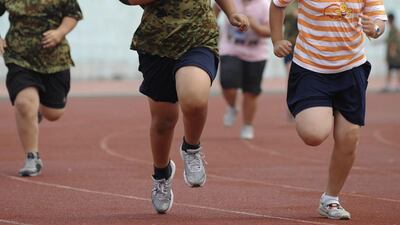In The National's story on body mass index (BMI) measurements, there was a nugget that ought to worry more of us. Discussing how blunt a measuring tool the BMI index is, Dubai nutritionist Rashi Chowdhary noted that some children were being told that they needed to lose weight because of a BMI test they were given in school.
The story discussed the problems with the BMI index – it is particularly bad at distinguishing between fat and muscle – but there is a wider point here about how children are motivated to make lifestyle changes. There is no doubt that too many children are overweight – Ms Chowdhary said she has seen eight-year olds with Type 2 diabetes, a disease more often seen in those 30 or 40 years older.
The question, however, is how is that information conveyed to the child and the parents and what effect it might have on growing bodies and growing minds.
Imposing such a simplistic way of thinking – you’re either too fat or too thin – on to children is dangerous, because they are still too young, too emotionally fragile, to understand that their self-worth is not connected to how they look. They also need to understand that the messages they receive from the outside world do not – and should not – form the totality of their self-image. It is a truism that a scale cannot tell you how good a daughter, sister, student or sportsperson you are.
Worse, such labelling so early risks damaging a lifelong relationship with food, leading children, as they enter the fragile teenage years, to have a combative relationship with what they eat.
And, worst of all, this labelling doesn’t work. It doesn’t take into account the role of the parents, of the schools that provide unhealthy meals, and of food courts in malls full of fast food. Children cannot be expected to take total responsibility for what they put into their bodies; they therefore should not be blamed for the results. And, of course, such public shaming hardly works. Anyone who has ever been berated by a loved one for being overweight will know the feeling it engenders is often sadness or defeatism – neither helpful emotions in the battle against fat.

